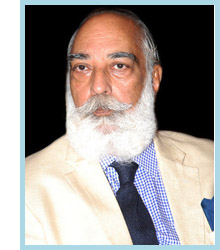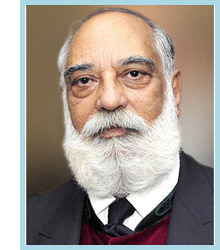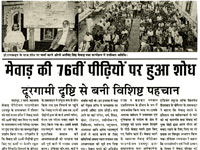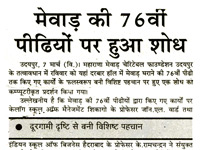

Resources - Media
The Raja's Rules: Timeless Continuity Tips from the World's Oldest Family Business
By Perry Garfinkel
March 15, 2010
 Two of the world's most distinguished professors of family business last week gave a periscope view of an ongoing study examining the Mewars of Udaipur, Rajasthan.
Two of the world's most distinguished professors of family business last week gave a periscope view of an ongoing study examining the Mewars of Udaipur, Rajasthan.
What, you never heard of the House of Mewar? Never heard of their product? If you're not from India or an Indo-phile, you're probably not alone. Neither have Tom Peters, Stephen Covey, Peter Drucker or Ken Blanchard. In fact, had Blanchard heard of the Mewars, he might have recast his book "The One-Minute Manager" as the "The One-and-a-Half-Millennium Manager." Doing so, he probably would have sold more than the measly 13 million copies he did peddle.
Even Professor John Ward, co-director for the Center for Family Enterprises at Northwestern University's Kellogg School of Management, was impressed when Professor K. Ramachandran, colleague on the other side of the globe specializing in Family Business and Wealth Management at the Indian School of Business (ISB) in Hyderabad, suggested studying the Mewars. After all, Dr. Ward had already looked at family businesses he thought were very old - businesses that went back only to 1526 and 1299!
From Palaces to Hotels
The New York Times
October 16, 2010
 Arvind Singh Mewar
Arvind Singh Mewar
Chairman of the HRH Group of Hotels and of the Maharana of Mewar Charitable Foundation, Udaipur, Rajasthan, India
AGE 65
DAILY HABIT Logs onto Facebook
NEVER WITHOUT His iPad
I WAS born in Udaipur in Rajasthan in 1944, three years before India achieved independence. Udaipur was founded in 1559 by my forefather Udai Singh.
The new Indian democracy meant that families and clans like ours, princely states headed by maharanas, maharajas and nizams, were stripped of their property and governing rights. In 1971, the government took away our privileges, including financial stipends.
My father, Bhagwat Singh Mewar, was the 75th in an unbroken chain of maharanas dating back to 734 A.D. who served as custodians of our region. In our tradition, we hold our possessions and authority in trust, passing them from generation to generation. We still uphold these traditions as a moral — not constitutional — responsibility.
Shriji Arvind Singh Mewar of Udaipur is now a B-school case study and he expects to be torn apart in the classroom
The Economic Times
August 24, 2012
 On this trip to Mumbai, Shriji Arvind Singh Mewar of Udaipur is ensconced in a suite at The Renaissance, Powai, where he will open the hotel's Mewar food festival with an exclusive dinner for a few special guests in the evening. This is rather convenient for the 66-year old Maharana. A new lift is being installed in Mewar House, Peddar Road, and the invitation to stay at The Renaissance saves him from having to climb up the stairs to his apartment on the top floor. Such are the little details on which a royal life is built. In an interview with CD, the 76th custodian of the House of Mewar talks about leadership, politics and his ongoing efforts to promote Rajasthan's living heritage:
On this trip to Mumbai, Shriji Arvind Singh Mewar of Udaipur is ensconced in a suite at The Renaissance, Powai, where he will open the hotel's Mewar food festival with an exclusive dinner for a few special guests in the evening. This is rather convenient for the 66-year old Maharana. A new lift is being installed in Mewar House, Peddar Road, and the invitation to stay at The Renaissance saves him from having to climb up the stairs to his apartment on the top floor. Such are the little details on which a royal life is built. In an interview with CD, the 76th custodian of the House of Mewar talks about leadership, politics and his ongoing efforts to promote Rajasthan's living heritage:
I believe you're now a business school case study?
Yes, the Indian School of Business (ISB) Hyderabad, along with Professor John Ward of Kellogg School of Management, has written a case study on our family called India's Mewar Dynasty. They've looked at things from the succession management point of view. One of the questions for classroom discussion is 'Has Shriji played his role well?' The students are probably going to tear me apart.
Does management as a subject interest you?
Hugely. I've attended several family business management courses at ISB and I'm constantly thinking about management issues. Leadership fascinates me the most, especially the aspect of how leaders are produced. Issues of succession and division are very important in India. Whether it is the Tatas or the Birlas, every business house started as a family. The Birlas have done well because they have embraced change. Otherwise people tend to hold on to old ideas too long.




